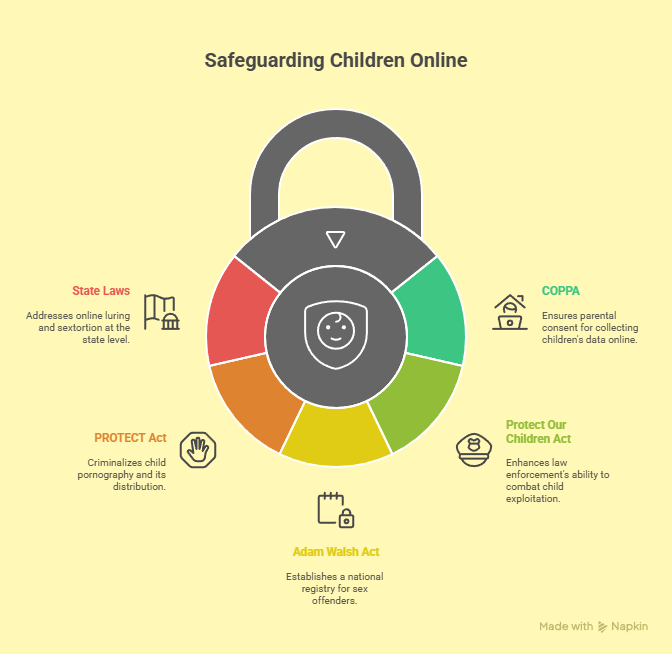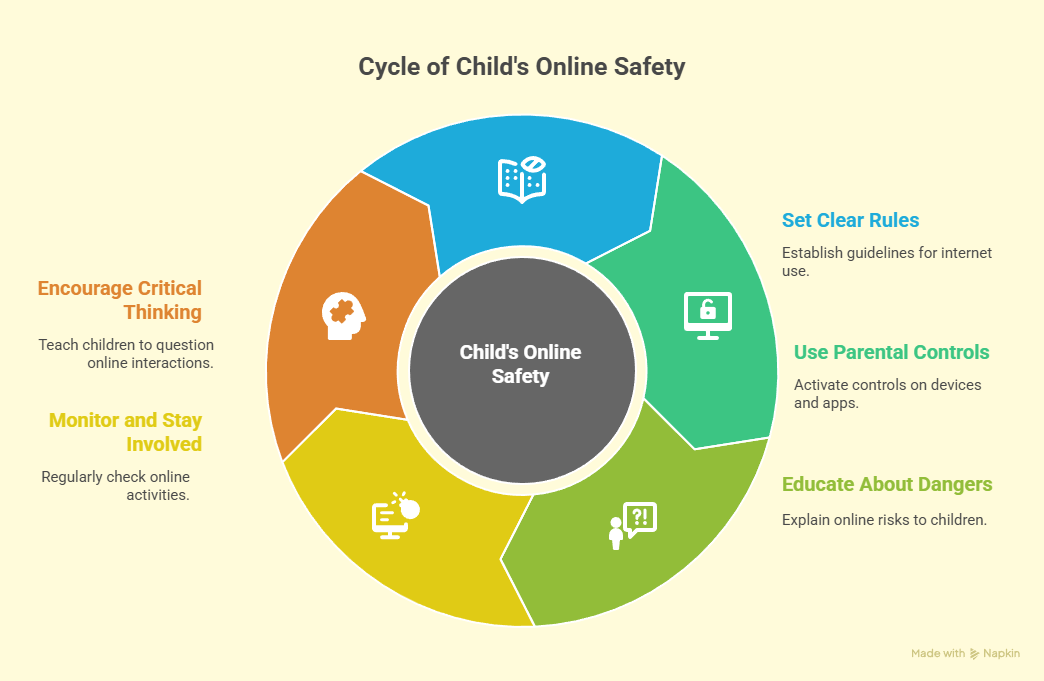The internet is a powerful tool for learning, communication, and entertainment. Children can explore ideas, connect with friends, and access endless educational resources online. However, this same space can also expose them to serious dangers, including online predators who target minors through social media, gaming platforms, and chat apps.
Online predators use deceptive tactics to befriend and manipulate children, often pretending to be peers or trustworthy adults. Their goal is to gain a child’s trust, gather personal information, and sometimes arrange in-person meetings. These interactions can lead to exploitation, emotional harm, and in severe cases, criminal abuse.
While this reality is concerning, parents and guardians can take active steps to safeguard their children. By understanding the laws that protect minors and following practical safety measures, families can significantly reduce the risks of online exploitation.
Table of Contents
Understanding the Threat of Online Predators
Online predators may operate through:
- Social media platforms such as Instagram, TikTok, and Snapchat.
- Online games and chat features where children interact with strangers.
- Messaging apps like WhatsApp, Messenger, or Discord.
Predators often use grooming techniques, a gradual process where they build trust, isolate the child, and normalize inappropriate behavior. They might use compliments, gifts, or promises to lure a child into sharing private information or explicit images.
U.S. Laws Protecting Children from Online Exploitation

Several federal and state laws in the United States aim to protect minors from online predators:
1. Children’s Online Privacy Protection Act (COPPA)
- Restricts the collection of personal data from children under 13 without parental consent.
- Applies to websites, apps, and online services directed at children.
2. Protect Our Children Act
- Strengthens law enforcement resources for investigating and prosecuting crimes involving the sexual exploitation of children online.
3. Adam Walsh Child Protection and Safety Act
- Creates a national sex offender registry and establishes monitoring requirements for convicted offenders.
4. PROTECT Act (Prosecutorial Remedies and Other Tools to end the Exploitation of Children Today)
- Criminalizes child pornography production, distribution, and possession, including digital forms.
5. State Cybercrime and Child Protection Laws
- Many states have their own statutes covering online luring, sextortion, and solicitation of minors through electronic means.
Warning Signs a Child May Be Targeted
Parents should watch for changes in behavior that could indicate contact with an online predator:
- Secretive online activities or switching screens when someone enters the room.
- Receiving unexplained gifts, money, or electronics.
- Spending unusual amounts of time in private online conversations.
- Emotional withdrawal, mood swings, or anxiety related to device use.
Practical Tips to Protect Children Online

1. Set Clear Rules for Internet Use
Establish guidelines for what sites, apps, and games are allowed. Set limits on screen time and encourage device use in shared family spaces.
2. Use Parental Controls and Privacy Settings
Activate built-in parental controls on devices and apps. Restrict location sharing and set privacy settings to limit who can contact your child.
3. Educate About Online Dangers
Explain, in age-appropriate language, that not everyone online is who they claim to be. Teach children to never share personal information, photos, or meet online friends in person without permission.
4. Monitor and Stay Involved
Check browsing history, friend lists, and messages regularly. Use monitoring apps if necessary, but also foster open communication so your child feels comfortable reporting suspicious activity.
5. Encourage Critical Thinking
Teach children to question suspicious requests, offers, or compliments from strangers online. Role-play scenarios so they know how to respond.
What to Do If You Suspect Online Predation
- Document evidence – Save screenshots of messages, usernames, and any other relevant data.
- Report to law enforcement – Contact local police or the FBI’s Internet Crime Complaint Center (IC3).
- Notify platform administrators – Most social media and gaming platforms have reporting tools for inappropriate contact.
- Seek professional help – Counselors and support groups can assist children in coping with the emotional impact.
Resources for Parents and Guardians
- National Center for Missing & Exploited Children (NCMEC) – CyberTipline for reporting child exploitation.
- FBI Safe Online Surfing Program – Online safety education for students.
- Stop.Think.Connect. Campaign – Cybersecurity awareness resources for families.

